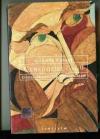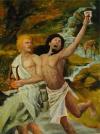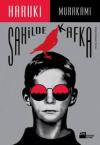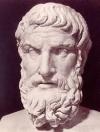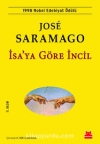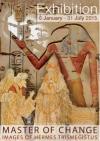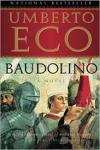
What is the error of creation?
“Why, Baudolino,” she said, laughing with innocent amazement, “does it seem to you that the world is perfect? Look at this flower, look at the delicacy of the stem, look at this kind of porous eye that triumphs in its catch of the morning dew as in a shell, look at the joy with which it offers itself to this insect that now is sucking its juice . . . Isn’t it beautiful?
“It is indeed beautiful. But, in fact, isn’t it beautiful that it is beautiful? Isn’t this a divine miracle?”
“Baudolino, tomorrow morning this flower will be dead, in two days it will be rotten. Come with me.”
She led him into the brush and showed him a mushroom, its red crown striped with yellow flames.
“Is this beautiful?” she said.
“It is beautiful.”
“It’s poisonous. Anyone who eats it, dies. Do you consider a creation perfect when death is hiding in it? You know that I, too, would be dead one day, and I, too, would be rotten matter, if I were not dedicated to God’s redemption?”
“Surely you’re not a Christian, too, Baudolino, like the monsters of Pndapetzim? The Christians who killed Hypatia believed in a cruel divinity who had created the world, and, with it, death, suffering and – even worse than physical suffering – the sickness of the soul. Created beings are capable of hating, killing, of making their fellows suffer. You can’t believe that a just God could have destined his children to this misery. . . .”
“These things are done by unjust men, and God punishes them, while saving the good.”
“But then why would this God have created us, only to expose us to the risk of damnation?”
“Why? Because the supreme good is the freedom to do good or evil, and, to give his children this supreme good, God must accept the fact that some of them will make bad use of it.”
“Why do you say that freedom is good?”
“Because if they deprive you of it, if they put you in chains, if they will not allow you to. do what you wish, you suffer, and therefore the absence of freedom is an. evil.”
“You can turn your head so that you can look behind you, but can you really turn it until you can see your own back? Can you enter that lake and remain under water until evening, I mean really under water, without ever sticking your head out?” she asked, laughing.
“No, because if I tried to turn my head completely, I would break my neck, if I remained under water it would prevent me from breathing. God created me with these restrictions to prevent me from doing myself harm.”
“Then you say that he has deprived you of some freedoms for a good end, is that right?”
“He took them from me so that I would not suffer.”
“Then why has he given you the freedom to choose between good and evil, with the risk that you may then suffer eternal punishments?”
“God gave us freedom thinking that we would use it well. But there was the revolt of the angels, which brought evil into the world, and the serpent tempted Eve, so now we all suffer from original sin. It isn’t God’s fault.”
“And who created the rebel angels and the serpent?”
“God, of course, but before they rebelled the angels were good, as he had made them.”
“Then it was they who created evil?’
“No, they committed it, but it existed before, as a possibility of rebellion against God.”
“So it was God who created evil?”
“Hypatia, you are clever, sensitive, quick, you can conduct a disputatio much better than I, even though I studied in Paris. But don’t say such things to me about the good God. He cannot wish evil.”
“Certainly not. A God who wishes evil would be the contrary of God”
“So?”
“So God found evil beside him, without wishing it, as the dark part of. himself.”
“But God is the totally perfect. being!”
“Of course, Baudolino. God is the greatest perfection that can exist, but if you only knew what hard work it is to be perfect! Now, Baudolino, I’ll tell you who God is, or, rather, what he is not.”
She truly was afraid of nothing. She said:
“God is the Unique, and he is so perfect that he does not resemble any of the things that exist or any of the things that do not; you cannot describe him using your human intelligence, as if he were someone who becomes angry if you are bad or who worries about you out of goodness, someone who has a mouth, ears, face, wings, or that is spirit, father or son, not even of himself. Of the Unique you cannot say he is or is not, he embraces all but is nothing; you can name him only through dissimilarity, because it is futile to call him Goodness, Beauty, Wisdom, Amiability, Power, Justice, it would be like calling him Bear, Panther, Serpent, Dragon, or Gryphon, because whatever you say of him you will never express him. God is not body, is not figure, is not form; he does not have quantity, quality, weight, or lightness; he does not see, does not hear, does not know disorder and perturbation; he is not soul, intelligence, imagination, opinion, thought, word, number, order, size; he is not equality and is not inequality, is not time and is not eternity; he is a will without purpose. Try to understand, Baudolino: God is a lamp without flame, a flame without fire, a fire without heat, a dark light, a silent rumble, a blind flash, a luminous soot, a ray of his own darkness, a circle that expands concentrating on its own center, a solitary multiplicity; he is . . . is . . .”
She paused, seeking an example that would convince them both, she the teacher and he the pupil. “He is a space that is not, in which you and I are the same thing, as we are today in this time that doesn’t flow.”
A faint flame trembled on her cheek. He was silent, frightened by that incongruous example, but how could he consider incongruous any addition to a list of incongruities? Baudolino felt the same flame piercing his chest, but in his fear for her embarrassment, he stiffened, not allowing a single muscle of his face to betray the stirrings of his heart, nor his voice to tremble, and asked, with theological firmness:
“But . . . creation then? And evil?”
Hypatia’s face resumed its roseate pallor. “Then the Unique, because of his perfection, through generosity of himself, tends to expand, to widen in ever broader spheres of his own fullness; he is, like a candle, victim of the spreading light, the brighter it grows the more it melts. “Yes, God liquefies in the shadows of himself, becomes a throng of divine messengers, Eons that have much of his power, but in a form already weaker. There are many gods, demons, Archons, Tyrants, Forces, Sparks, Stars, and what the Christians call angels or archangels. But they are not. created by the Unique, they are an emanation of him.”
“Emanation?”
“You see that bird? Sooner or later it will generate another bird through an egg, as a hypatia can generate a child from her womb. But, once generated, the creature, whether hypatia or “little bird, lives on its own, survives even if the mother dies. Now think, on the contrary, of fire. Fire does not generate heat: it emanates it. Heat is the same thing as fire; if you were to put out the fire, the heat would also cease. The heat of the fire is very strong where the fire is born, and it becomes gradually weaker as the flame becomes smoke. So it is with God. As he gradually expands from his own dark center, he somehow loses vigor, and he loses more and more until he becomes viscous and insensitive matter, like the shapeless wax of the melting candle. The Unique could not wish to emanate so far from himself, but he cannot resist this dissolving of himself into multiplicity and disorder.”
“And this God of yours cannot dissolve the evil that . . . that forms around him?”
“Oh, yes, he could. The Unique constantly tries to reabsorb this sort of breath that can become poison, and for seventy times seven thousand years he has succeeded continually to make his residue return into nothingness. The life of God was a regulated breathing, he panted without effort. Like this: listen.” She breathed in the air, vibrating her delicate nostrils, then exhaled the breath from her “mouth. “One day, however, he was unable to control one of his intermediary powers, which we call the Demiurge, and which is perhaps Sabaoth or Ildabaoth, the false God of the Christians. This imitation of God, through a mistake, or through pride, or through ignorance, created time, where before there had been only eternity. Time is an eternity that stammers. You understand? And with time, he created fire, which gives heat “but also risks burning everything; water, which quenches thirst but also drowns; earth, which nourishes the grasses but can become avalanche and suffocate them; air, which lets us breathe but can become hurricane. . . . He did everything wrong, poor Demiurge. He made the sun, which gives light, but can scorch meadows; the moon, which succeeds in dominating night for only a few days, then grows thinner and dies; the other celestial bodies, which are splendid but can emit baleful influences, and then the creatures endowed with intelligence, but unable to understand the great mysteries; the animals, who are sometimes faithful and sometimes threaten us; the vegetables, which feed us but have brief life; the minerals, without life, without soul, without intelligence, condemned never to understand anything. The Demiurge was like a child, who messes in the mud to imitate the beauty of a unicorn, and what comes out looks more like a mouse!”
“So the world is a sickness of God?”
“If you are perfect, you cannot fail to emanate yourself; if you emanate yourself, you become sick. And you must try to understand that God, in his fullness, is also the place, or non-place, where the opposites are confounded, isn’t he?”
“The opposites?”
“Yes. We feel heat and cold, light and darkness, and all those things that are one contrary to the other. Sometimes we do not like the cold, and to us it seems bad compared to heat; “sometimes the heat is too great, and we want coolness. We are the ones who, confronted with opposites, believe, as our whim, our passion takes us, that one of them is good and the other evil. Now, in God opposites are reconciled and find reciprocal harmony. But when God begins to be emanated, he can no longer control the harmony of the opposites, and this is broken and they fight with one another. The Demiurge has lost control of the opposites, and has created a world where silence and noise, yes and no, one good against another good fight among themselves. This is what we feel is evil. “Warming to her argument, she moved her hands like a little girl who, speaking of a mouse, imitates its form, or, naming a tempest, draws whirlwinds in the air.
“You speak of the errors of creation, Hypatia, and of evil, but as if none of it touched you, and you live in this wood as if everything were beautiful like you.”
“If evil itself comes from God, there must be something good in evil. Listen to me, because you are a man, and men are not used to thinking in the right way of everything that is.”
“I knew it. I also think wrong.”
“No, you just think. And thinking isn’t enough; this isn’t the right way. Now: try to imagine a spring that has no source and spreads out into a thousand rivers, without ever going dry. The spring remains calm always, cool and clear, while the rivers flow towards different places, and become murky with sand, become congested among rocks, and cough, strangled; and sometimes they run dry. Rivers suffer greatly; did you know that? And yet, however muddy the rivers or the streams may be, they are still water, and come from the same source as this lake. This lake suffers less than a river because in its clarity it recalls better the source from which it is born, a pond full of insects suffers more than a lake or a stream. But all in some way suffer because they would like to return whence they came, and they have forgotten how.”“Hypatia took Baudolino by the arm, and made him turn towards the wood. As she did this, her head moved close to his, and he sensed the vegetal perfume of those tresses. ”Look at that tree. What flows in it, from the roots to the last leaf, is the same life. But the roots are strengthened in the earth, the trunk grows sturdier and survives all the seasons, whereas the boughs tend to turn brittle and break, the leaves last a few months and then fall, the buds live a few weeks. There is more sickness in the fronds than in the trunk. The tree is one, but it suffers as it expands, because it becomes many, and in multiplying, it is weakened.”“But the fronds are beautiful; you yourself enjoy their shade.”“You see, Baudolino? You, too, can become wise. If these fronds didn’t exist, we wouldn’t sit here and talk about God; if the wood didn’t exist, we would never have met, and this perhaps would be the worst of evils.” She said this as if it were bare, simple truth, but Baudolino felt his chest pierced once again, unable or unwilling to reveal his tremor.”
“Then explain this to me: how can the many be good, at least to some degree, if they are a sickness of the Unique?”
“You see, Baudolino? You, too, can become wise. You said, to some degree. In spite of error, a part of the Unique has remained in each of us thinking creatures; and also in each of the other creatures, from animals to dead bodies. Everything that surrounds us is inhabited by the gods: plants, seeds, flowers, roots, springs, each of them, though suffering at being only a bad imitation of the thought of God, could wish for nothing save to be united with him. We must find again the harmony between opposites, we must help the gods, we must revive these sparks, these memories of the Unique which lie still buried in our spirit and in things themselves.”
Twice Hypatia had casually said that it was beautiful to be with him. This encouraged Baudolino to return.
“One day Hypatia explained to him what they did to revive the divine spark in all things, because these things sympathetically referred to something more perfect than they, not directly to God, but to his less extenuated emanations. She led him to a spot near the lake where some sunflowers grew, while lotus flowers spread over the water.”
“You see what the heliotrope does? It moves following the sun, seeks it, prays to it, and it’s too bad you still don’t know how to listen to the murmur it makes in the air as it fulfills its circular motion in the arc of the day. You would realize that it sings its hymn to the sun. Now look at the lotus: it opens at sunrise, offers itself completely at the zenith, and closes when the sun goes away. It praises the sun, opening and closing its petals, as we open and close our lips when we pray.”
“These flowers live in sympathy with the planet and therefore retain a part of its power. If you act upon the flower, you will act upon the sun, if you can act upon the sun, you can influence its action, and from the sun be joined with something that lives in sympathy with the sun, and is more perfect than the sun. This doesn’t happen only with flowers; it happens with stones and with animals. Each of us is inhabited by a lesser god, who tries to connect us, through the more powerful, to our common origin. We learn from infancy to practice an art that allows us to act on the major gods and “reestablish the lost bond.”
“What does that mean?”
“It’s easy. We learn to weave together stones, herbs, odors, perfect and godlike, to form – how can I say it to you? – some vessels of sympathy that condense the strength of many elements. You know, a flower, a stone, even a unicorn, all have a divine character, but by themselves they are unable to evoke the greater gods. Our compounds, thanks to art, reproduce the essence that one wants to evoke, they multiply the power of each element.”
“And then when you have evoked these greater gods?”
“That point is only the beginning. We learn to become messengers between what is above and what is below, we prove that the current in which God emanates himself can be retraced, only a short way, but we show nature that this is possible. The supreme task, however, is not to connect a sunflower with the sun, it is to connect ourselves with our origin. This is where ascesis begins.”“In the beginning, we learn to behave in a virtuous manner, we do not kill living creatures, we try to spread harmony among the beings that are around us, and in doing this, we can revive hidden sparks everywhere. You see these blades of grass? They are now yellowed, and are drooping to the ground. I can touch them and make them vibrate again, make them feel what they have forgotten. “Look: little by little, they regain their freshness, as if they were just now springing from the earth. Yet this is not enough. To revive this blade of grass, it suffices to exercise the natural virtues, achieve perfection of sight and hearing, vigor of body, memory, and facility for learning, refinement of manners, through frequent ablutions, lustral ceremonies, hymns, prayers.
“You make a step forward by cultivating wisdom, strength, temperance, and justice, and finally you arrive at acquiring the purifying virtues: we try to separate the soul from the body, we learn to evoke the gods – not to speak of the gods, as the other philosophers did, but to act upon them, causing rains to fall through a magic sphere, setting amulets against earthquakes, testing the divinatory powers of tripods, animating statues to “obtain oracles, summoning Asclepius to heal the sick. But you have to be careful: in doing this we must always avoid being possessed by a god, because in that case we become unruly and agitated, and therefore move away from God. We must learn to do this in the most absolute calm.”
Hypatia took Baudolino’s hand; he kept it motionless so as not to end that sensation of warmth. “Baudolino, perhaps I am making you believe I am already far advanced in ascesis, like my older sisters. . . . If you only knew, on the contrary, how imperfect I still am. I still become confused when I put a rose in “contact with the superior power who is its friend. . . . And, you see? I still talk a great deal, and this is a sign that I am not wise, because virtue is won in silence. But I speak because you are here, and you must be instructed, and if I instruct a sunflower, why shouldn’t I instruct you? We will reach a more perfect stage when we are able to be together without speaking; it will be enough to touch each other and you will understand all the same. As with the sunflower.” She stroked the sunflower, in silence. Then, in silence, she began stroking Baudolino’s hand, and said only, at the end: “ “You feel?”
The next day she spoke to him of the silence cultivated by the hypatias, in order, she said, for him to learn it too. “You have to create an absolute calm, all around you. You remain alone, remote from everything we have thought, imagined, and felt; you find peace and serenity” “Then we will no longer experience wrath or desire, sorrow or happiness. We will have moved out of ourselves, rapt in absolute solitude and profound calm. We will no longer look at things beautiful and good; we will be beyond goodness itself, beyond the chorus of virtues, like someone entering the sanctum of. the church, leaving behind the statues of the gods, as his vision is no longer of images but of God himself. We must stop invoking intermediary powers; passing beyond them, we will overcome the flaw, in that retreat, in that inaccessible and holy place, we will arrive beyond the race of the “gods and the hierarchies of the Eons, all these things will now be in us as memory of something we have cured of its sickness of being. That will be the end of the journey, the loosening of every bond, the flight of one, now alone, towards the Only. In this return to the absolutely simple we will no longer see anything, except the glory of the darkness. Soul and intellect drained, we will arrive beyond the realm of the mind; in veneration we will rest there, as if we were a sun rising, with closed pupils we will gaze at the sun’s light, we will become fire, fire in that darkness, and “along paths of fire we will complete our arc. And, at that moment, when we have traveled against the current of the river, and have proved not only to ourselves but also to the gods and to God that one can move against the current, we will have healed the world, killed evil, made death die, we will have dissolved the knot in which the fingers of the Demiurge were entangled. We, Baudolino, are destined to heal God, to us his redemption has been entrusted; we will bring back, through “ our ecstasy, all creation in the very heart of the Unique One. We will give the Unique One the strength to take that great breath that enables him to absorb into himself the evil he has exhaled.”
“You do it? Some one of you has done it?”
“We are waiting to succeed in it; all of us have been preparing ourselves, for centuries, so that one of us will succeed. What we have learned, since childhood, is that it’s not necessary for all of us to achieve this miracle: it’s enough if one day, even in another thousand years, just one of us, the chosen one, reaches the moment of supreme perfection, in which she feels one with her own remote origin, and the miracle will be achieved. Then, proving that from the multiplicity of the suffering world it is possible to return to the Unique, we will have given back to God peace and security, the strength to recompose himself in his own center, the energy to resume the rhythm of his own breath.”
Umberto Eco, Baudolino






